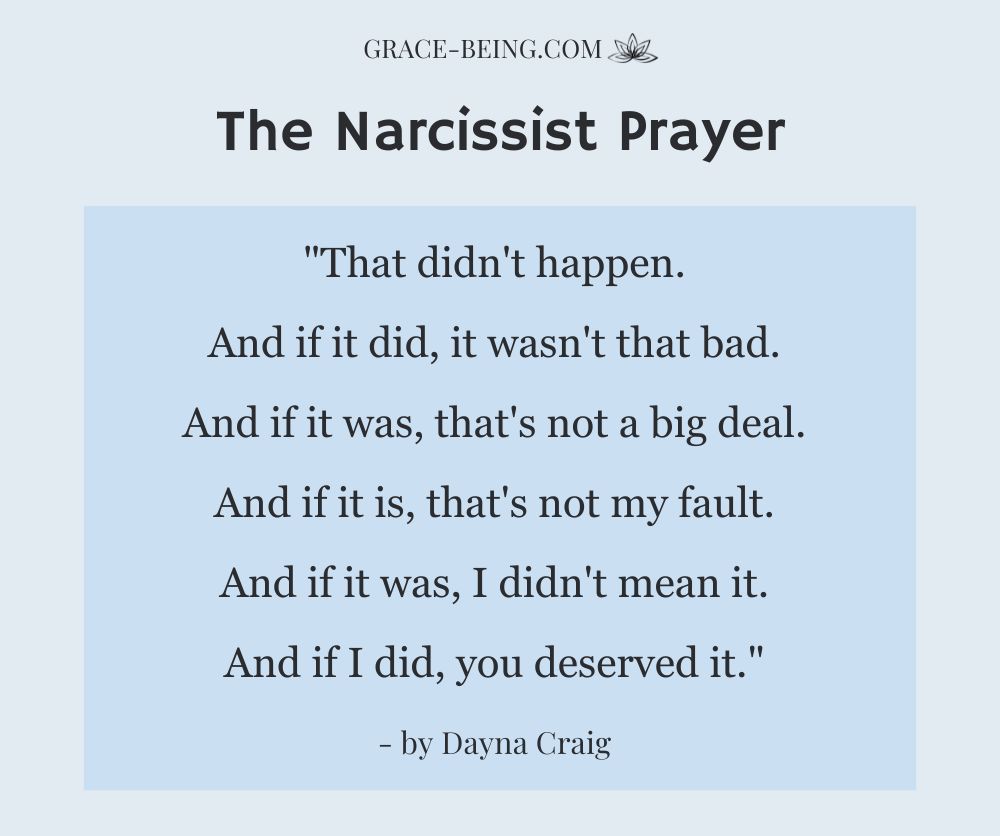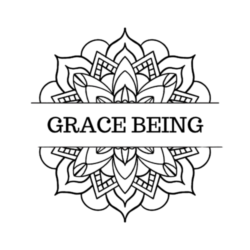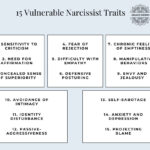The Narcissist Prayer Explained – A Poem on Narcissists
Let’s explore the profound depths in a narcissist prayer written by Dayna Craig.
As you read through this narcissist prayer poem you’ll immediately be able to resonate and understand how true the message is that this narc prayer is delivering to anyone who reads it.
The Narcissist Prayer by Dayna Craig

Unveiling The Narcissist Prayer
When I read this narcissist prayer text I got the chills as there is so much truth behind it. To go deeper and unveil the truth behind this narcissistic prayer, let’s go through each line and I’ll also bring up examples so you can relate to the meaning behind each verse:
“That didn’t happen.“
This phrase in the Narcissist Prayer encapsulates a common defense mechanism in narcissism: denial, one of the 12 traits of a narcissist. When confronted with their actions or words, a narcissist often resorts to outright denial, claiming that the event or statement in question never occurred.
This tactic isn’t just about avoiding blame; it’s a fundamental part of the narcissist’s self-image preservation. They are often so invested in a fabricated version of reality that admitting fault or error can feel like an existential threat.
For example, consider a scenario where a narcissist blatantly insults you. When later confronted, they might assert with convincing confidence, “That didn’t happen.” This denial can be bewildering and frustrating for those around them. It’s not just about forgetting or misremembering. It’s a deliberate attempt to reshape reality to fit their narrative – a perfect example of narcissist gaslighting.
It’s a potent tool in the narcissist’s arsenal, enabling them to deflect responsibility and maintain their façade of perfection.
Related: Karma Narcissist Quotes
“And if it did, it wasn’t that bad.“
This line from the narcissist’s prayer introduces a classic tactic of minimization. When a narcissist can’t deny an event outright, they often downplay its significance or impact. This is a deflection technique, aimed at reducing the perceived severity of their actions, suggesting that even if the event did occur, it was trivial and not worth fussing over.
For example when a narcissist is caught lying, instead of acknowledging the deceit, they might say, “Okay, maybe I stretched the truth, but it wasn’t a big deal.”
This minimization serves two purposes:
- It allows the narcissist to maintain a sense of superiority
- And it also invalidates the feelings or reactions of others
It’s a subtle form of gaslighting, implying that the other person is overreacting or being overly sensitive.
Minimization can be particularly damaging in relationships. If a narcissist neglects their partner’s emotional needs, and the partner expresses hurt, the narcissist might respond with:
“You’re making a mountain out of a molehill.”
This not only avoids accountability but also undermines the partner’s feelings and experiences.
Related: 40 Funny Things To Say To A Narcissist
“And if it was, that’s not a big deal.“
A deeper layer of minimization is highlighted in this narcissistic prayer verse. The narcissist acknowledges the occurrence but trivializes its importance. It’s an attempt to belittle the issue and dismiss any negative consequences, suggesting that even if the event happened as claimed, it’s not significant enough to warrant attention or concern.
For instance, if a narcissist borrows money and fails to return it. When confronted, they might admit to borrowing the money but then add, “It’s not a big deal; it was just a small amount.” This response not only dodges responsibility but also implies that the other person is making an unnecessary fuss over a trivial matter.
By stating “it’s not a big deal,” the narcissist invalidates the other person’s feelings and experiences. It’s a way of controlling the narrative, making the victim question the validity of their reaction and the seriousness of the situation.
“And if it is, that’s not my fault.“
This line in “The Narcissist Poem” demonstrates a shift from denial and minimization to outright deflection of responsibility. It’s a common narcissist red flag where they acknowledge that the situation may be problematic but refuse to accept any personal responsibility for it.
A classic example in the context of narcissistic mothers might be related to parenting. If a child expresses feeling neglected or misunderstood, one of the common things narcissist mothers say is:
“Well, if you feel that way, it’s not my fault. I’ve done everything a mother should.”
This kind of statement shifts the blame away from the narcissist, often implying that the problem lies with the other person’s perceptions or actions.
In romantic relationships, this phrase is also common and may sound like:
“Well, if you’re upset, it’s not my fault. You never reminded me, and I’ve been very busy.”
This not only sidesteps responsibility but also subtly blames the partner for not providing a reminder or for having expectations in the first place.
“And if it was, I didn’t mean it.“
This verse in “The Narcissist Poem” reflects a common tactic. By saying “I didn’t mean it,” the narcissist appears to acknowledge their mistake while simultaneously absolving themselves of intentional wrongdoing. It’s a subtle way of avoiding genuine accountability which can be really dangerous especially in relationships between narcissists and empaths.
Empaths, by nature, are highly sensitive and attuned to the emotions of others, often placing others’ needs above their own. When a narcissist uses phrases like “I didn’t mean it,” empaths are prone to accept these statements at face value, driven by their desire to understand and forgive.
This can lead to a toxic cycle where the empath continually absorbs and excuses the narcissist’s harmful behavior. The empath’s inherent compassion and tendency to internalize others’ emotions make them particularly vulnerable to the narcissist’s manipulation.
They may start believing they are overreacting or misunderstanding the situation, leading to a diminishing sense of self-worth and an increased tolerance for unacceptable behavior. This dynamic can keep empaths trapped in emotionally abusive relationships, struggling to distinguish between genuine remorse and manipulative apologies which reinforces trauma bonding with narcissists.
“And if I did, you deserved it.“
This line is emblematic of the behavior of a malignant narcissist. Unlike other types, malignant narcissists combine grandiosity with an element of sadism, taking pleasure in the pain of others. When they say, “And if I did, you deserved it,” they’re not just denying blame; they’re actively turning the situation into an attack on the victim.
In relationships, this manifests as cruel and vindictive actions. For instance, if a malignant narcissist is confronted about emotional or verbal abuse, they might respond with this line, implying that the victim’s actions or character flaws justify the abuse.
It’s a tactic that not only absolves them of guilt but also serves to belittle and demean their partner, further consolidating their control and power.
This behavior is a dangerous trait of malignant narcissists. It reflects their need to dominate and their lack of empathy, one of the traits on the narcissist checklist.
Final Thoughts on The Narcissist Prayer
The Narcissist Prayer by Dayna Craig offers a profound insight into the manipulative and harmful patterns of narcissistic behavior. Each line of the prayer reveals a different tactic – denial, minimization, blame-shifting, and sadism – employed by narcissists to maintain control and evade responsibility. These patterns are particularly damaging in relationships, where they can lead to a cycle of abuse and emotional turmoil.
For victims, recognizing these patterns is the first step towards healing from narcissistic abuse. Understanding that these behaviors are part of a narcissist’s defense mechanism, not reflections of your worth or actions, is crucial. It’s important to remember that you are not responsible for a narcissist’s actions or the harm they cause.
Moving forward, narcissistic abuse therapy can be an invaluable resource. A mental health professional specializing in narcissistic abuse can provide the support and guidance needed to navigate the complex emotions and challenges that arise from such relationships. Therapy offers a safe space to heal, rebuild self-esteem, and develop strategies for setting boundaries and protecting oneself from further harm.
Additionally, support groups and communities of individuals who have experienced similar situations can be a source of understanding and encouragement. Connecting with others who have walked this path can help in feeling less isolated and more empowered.
If you’re struggling to heal from narcissistic abuse, I warmly welcome you to my Narcissistic Abuse Recovery Program. It’s an easy self-paced online course which you can do at your own pace. My signature program combines scientific and spiritual tools for holistic healing of the body, mind, and spirit.
FAQs on The Narcissist Prayer
The Narcissist Prayer is a short verse that encapsulates the typical behaviors and thought patterns of a narcissist, particularly in how they deny, minimize, and deflect blame. It highlights the various stages of denial and manipulation a narcissist employs to avoid accountability.
The Narcissist Prayer Poem illustrates the psychological mechanisms narcissists use to manipulate and evade responsibility. Each line of the poem reveals a different tactic – from denial and minimization to blame-shifting and gaslighting – showcasing the narcissist’s inability to acknowledge and take responsibility for their actions.
Related Articles:
Do Narcissists Feel Guilt?
How to Deal with a Narcissist
Weird Things Narcissists Do Sexually
Do Narcissists Know They Are Narcissists?
10 Symptoms of Daughters of Narcissistic Fathers







